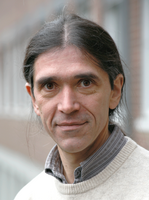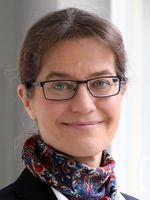Episode 9: At the expense of others?
Climate-neutral economy without harmful side effects
08.12.2022

By 2045, Germany should be greenhouse gas neutral, at least on a net basis. However, if we stick to our consumption patterns and at the same time enforce high standards of nature conservation, climate protection and animal welfare, this will contribute to rising food prices and put strain on natural resources such as forests in other parts of the world. How can agriculture and forestry contribute to the transformation towards a climate-neutral economy and society? Where do leakage effects occur and does a CO2 emission tax help to mitigate them?
„If we want to maintain our level of consumption, but at the same time cut down production in Europe, then it will automatically mean that we will import more natural raw materials, which we want to protect in Europe, but also more emissions.“
Prof. Dr. Karen Pittel, Director of the ifo Center for Energy, Climate, and Resources
A recent study by the Thünen Institute of Forestry has shown that the implementation of the EU Biodiversity Strategy, for example, would lead to significant shifting effects because the demand for wood products in Germany and Europe will not decline. The demand for wood for the construction industry, for example, which is likely to increase further due to the current timber construction subsidies, would then also be met in regions where forests are not sustainably managed, according to experts.
Such leakage effects also exist in other areas of production, which are often not obvious to consumers. For example, in the case of food or biofuels. The EU's promotion of biofuels, for example, has led to massive changes in land use in the global South in order to be able to produce palm oil on a large scale. Policymakers are therefore called upon to take such effects into account in incentives and trade agreements.
In this episode, our guests Karen Pittel, Head of the Centre for Energy, Climate and Resources at the Munich-based Ifo Institute, Matthias Dieter, Head of Thünen Institute for Forestry, and Bernhard Osterburg, Head of the Climate and Soil Unit at Thünen Institute, discuss whether the extension of the CO2 emissions tax to agricultural and forestry products and CO2 border adjustment are proven means of preventing leakage effects. They talk about how the joint use of agricultural land for food and energy production, for example, can keep farmers in Germany competitive and discuss UN initiatives such as REDD+. The mechanism is intended to help promote the sustainable management of forests and their use as carbon reservoirs worldwide.
Sources and further readings
- Flach L, Pfeiffer J, Pittel K (2022): Fairness and Self-Interest in International Climate Protection. Wirtschaftsdienst 102 (Suppl 1), 12–20 (2022).
- Schier F, Iost S, Seintsch B, Weimar H, Dieter M (2022): Assessment of Possible Production Leakage from Implementing the EU Biodiversity Strategy on Forest Product Markets. Forests 2022, 13, 1225.
- Thünen Working Paper 136a: Integrating agriculture into carbon pricing
- Thünen-Working Paper on the impact of current policy strategies (in German)
- Video on the main report of the German Advisory Council on Global Change (WBGU)
- Climate protection in agriculture and forestry (in German)
- Contribution of trade to sustainable development
- Sustainability policy of the Federal Republic of Germany

Prof. Dr Matthias Dieter heads the Thünen Institute of Forestry. His research focuses on forest management in a global context and international timber markets. Among other things, the forest scientist is involved in the EU Expert Group on Wood-Based Economy and advises the Federal Ministry of Food and Agriculture in the Scientific Advisory Council on Forest Policy.

As head of the Climate and Soil Unit at the Thünen Institute, agricultural economist Bernhard Osterburg coordinates the research institute's policy advice on climate protection. He is an expert when it comes to the climate protection effects of the EU's Common Agricultural Policy or CO2 pricing, for example.

Prof. Dr Karen Pittel heads the ifo Center for Energy, Climate, and Resources in Munich. She is also a professor of economics at the Ludwig-Maximilians-Universität in Munich. In addition to dealing with exhaustible natural resources and new concepts for energy supply, she also deals with the balancing of interests in international climate protection.





Comments (0)
No comments found!